- Home
- Paulo Coelho
The Alchemist - 10th Anniversary Edition Page 12
The Alchemist - 10th Anniversary Edition Read online
Page 12
The boy reached through to the Soul of the World, and saw that it was a part of the Soul of God. And he saw that the Soul of God was his own soul. And that he, a boy, could perform miracles.
THE SIMUM BLEW THAT DAY AS IT HAD NEVER BLOWN before. For generations thereafter, the Arabs recounted the legend of a boy who had turned himself into the wind, almost destroying a military camp, in defiance of the most powerful chief in the desert.
When the simum ceased to blow, everyone looked to the place where the boy had been. But he was no longer there; he was standing next to a sand-covered sentinel, on the far side of the camp.
The men were terrified at his sorcery. But there were two people who were smiling: the alchemist, because he had found his perfect disciple, and the chief, because that disciple had understood the glory of God.
The following day, the general bade the boy and the alchemist farewell, and provided them with an escort party to accompany them as far as they chose.
THEY RODE FOR THE ENTIRE DAY. TOWARD THE END OF the afternoon, they came upon a Coptic monastery. The alchemist dismounted, and told the escorts they could return to the camp.
“From here on, you will be alone,” the alchemist said. “You are only three hours from the Pyramids.”
“Thank you,” said the boy. “You taught me the Language of the World.”
“I only invoked what you already knew.”
The alchemist knocked on the gate of the monastery. A monk dressed in black came to the gates. They spoke for a few minutes in the Coptic tongue, and the alchemist bade the boy enter.
“I asked him to let me use the kitchen for a while,” the alchemist smiled.
They went to the kitchen at the back of the monastery. The alchemist lighted the fire, and the monk brought him some lead, which the alchemist placed in an iron pan. When the lead had become liquid, the alchemist took from his pouch the strange yellow egg. He scraped from it a sliver as thin as a hair, wrapped it in wax, and added it to the pan in which the lead had melted.
The mixture took on a reddish color, almost the color of blood. The alchemist removed the pan from the fire, and set it aside to cool. As he did so, he talked with the monk about the tribal wars.
“I think they’re going to last for a long time,” he said to the monk.
The monk was irritated. The caravans had been stopped at Giza for some time, waiting for the wars to end. “But God’s will be done,” the monk said.
“Exactly,” answered the alchemist.
When the pan had cooled, the monk and the boy looked at it, dazzled. The lead had dried into the shape of the pan, but it was no longer lead. It was gold.
“Will I learn to do that someday?” the boy asked.
“This was my Personal Legend, not yours,” the alchemist answered. “But I wanted to show you that it was possible.”
They returned to the gates of the monastery. There, the alchemist separated the disk into four parts.
“This is for you,” he said, holding one of the parts out to the monk. “It’s for your generosity to the pilgrims.”
“But this payment goes well beyond my generosity,” the monk responded.
“Don’t say that again. Life might be listening, and give you less the next time.”
The alchemist turned to the boy. “This is for you. To make up for what you gave to the general.”
The boy was about to say that it was much more than he had given the general. But he kept quiet, because he had heard what the alchemist said to the monk.
“And this is for me,” said the alchemist, keeping one of the parts. “Because I have to return to the desert, where there are tribal wars.”
He took the fourth part and handed it to the monk.
“This is for the boy. If he ever needs it.”
“But I’m going in search of my treasure,” the boy said. “I’m very close to it now.”
“And I’m certain you’ll find it,” the alchemist said.
“Then why this?”
“Because you have already lost your savings twice. Once to the thief, and once to the general. I’m an old, superstitious Arab, and I believe in our proverbs. There’s one that says, ‘Everything that happens once can never happen again. But everything that happens twice will surely happen a third time.’” They mounted their horses.
“I WANT TO TELL YOU A STORY ABOUT DREAMS,” SAID THE alchemist.
The boy brought his horse closer.
“In ancient Rome, at the time of Emperor Tiberius, there lived a good man who had two sons. One was in the military, and had been sent to the most distant regions of the empire. The other son was a poet, and delighted all of Rome with his beautiful verses.
“One night, the father had a dream. An angel appeared to him, and told him that the words of one of his sons would be learned and repeated throughout the world for all generations to come. The father woke from his dream grateful and crying, because life was generous, and had revealed to him something any father would be proud to know.
“Shortly thereafter, the father died as he tried to save a child who was about to be crushed by the wheels of a chariot. Since he had lived his entire life in a manner that was correct and fair, he went directly to heaven, where he met the angel that had appeared in his dream.
“‘You were always a good man,’ the angel said to him. ‘You lived your life in a loving way, and died with dignity. I can now grant you any wish you desire.’
“‘Life was good to me,’ the man said. ‘When you appeared in my dream, I felt that all my efforts had been rewarded, because my son’s poems will be read by men for generations to come. I don’t want anything for myself. But any father would be proud of the fame achieved by one whom he had cared for as a child, and educated as he grew up. Sometime in the distant future, I would like to see my son’s words.’
“The angel touched the man’s shoulder, and they were both projected far into the future. They were in an immense setting, surrounded by thousands of people speaking a strange language.
“The man wept with happiness.
“‘I knew that my son’s poems were immortal,’ he said to the angel through his tears. ‘Can you please tell me which of my son’s poems these people are repeating?’
“The angel came closer to the man, and, with tenderness, led him to a bench nearby, where they sat down.
“‘The verses of your son who was the poet were very popular in Rome,’ the angel said. ‘Everyone loved them and enjoyed them. But when the reign of Tiberius ended, his poems were forgotten. The words you’re hearing now are those of your son in the military.’
“The man looked at the angel in surprise.
“‘Your son went to serve at a distant place, and became a centurion. He was just and good. One afternoon, one of his servants fell ill, and it appeared that he would die. Your son had heard of a rabbi who was able to cure illnesses, and he rode out for days and days in search of this man. Along the way, he learned that the man he was seeking was the Son of God. He met others who had been cured by him, and they instructed your son in the man’s teachings. And so, despite the fact that he was a Roman centurion, he converted to their faith. Shortly thereafter, he reached the place where the man he was looking for was visiting.’
“‘He told the man that one of his servants was gravely ill, and the rabbi made ready to go to his house with him. But the centurion was a man of faith, and, looking into the eyes of the rabbi, he knew that he was surely in the presence of the Son of God.’
“‘And this is what your son said,’ the angel told the man. ‘These are the words he said to the rabbi at that point, and they have never been forgotten: “My Lord, I am not worthy that you should come under my roof. But only speak a word and my servant will be healed.””’
The alchemist said, “No matter what he does, every person on earth plays a central role in the history of the world. And normally he doesn’t know it.”
The boy smiled. He had never imagined that questions about life would
be of such importance to a shepherd.
“Good-bye,” the alchemist said.
“Good-bye,” said the boy.
THE BOY RODE ALONG THROUGH THE DESERT FOR SEVERAL hours, listening avidly to what his heart had to say. It was his heart that would tell him where his treasure was hidden.
“Where your treasure is, there also will be your heart,” the alchemist had told him.
But his heart was speaking of other things. With pride, it told the story of a shepherd who had left his flock to follow a dream he had on two different occasions. It told of Personal Legend, and of the many men who had wandered in search of distant lands or beautiful women, confronting the people of their times with their preconceived notions. It spoke of journeys, discoveries, books, and change.
As he was about to climb yet another dune, his heart whispered, “Be aware of the place where you are brought to tears. That’s where I am, and that’s where your treasure is.”
The boy climbed the dune slowly. A full moon rose again in the starry sky: it had been a month since he had set forth from the oasis. The moonlight cast shadows through the dunes, creating the appearance of a rolling sea; it reminded the boy of the day when that horse had reared in the desert, and he had come to know the alchemist. And the moon fell on the desert’s silence, and on a man’s journey in search of treasure.
When he reached the top of the dune, his heart leapt. There, illuminated by the light of the moon and the brightness of the desert, stood the solemn and majestic Pyramids of Egypt.
The boy fell to his knees and wept. He thanked God for making him believe in his Personal Legend, and for leading him to meet a king, a merchant, an Englishman, and an alchemist. And above all for his having met a woman of the desert who had told him that love would never keep a man from his Personal Legend.
If he wanted to, he could now return to the oasis, go back to Fatima, and live his life as a simple shepherd. After all, the alchemist continued to live in the desert, even though he understood the Language of the World, and knew how to transform lead into gold. He didn’t need to demonstrate his science and art to anyone. The boy told himself that, on the way toward realizing his own Personal Legend, he had learned all he needed to know, and had experienced everything he might have dreamed of.
But here he was, at the point of finding his treasure, and he reminded himself that no project is completed until its objective has been achieved. The boy looked at the sands around him, and saw that, where his tears had fallen, a scarab beetle was scuttling through the sand. During his time in the desert, he had learned that, in Egypt, the scarab beetles are a symbol of God.
Another omen! The boy began to dig into the dune. As he did so, he thought of what the crystal merchant had once said: that anyone could build a pyramid in his backyard. The boy could see now that he couldn’t do so if he placed stone upon stone for the rest of his life.
Throughout the night, the boy dug at the place he had chosen, but found nothing. He felt weighted down by the centuries of time since the Pyramids had been built. But he didn’t stop. He struggled to continue digging as he fought the wind, which often blew the sand back into the excavation. His hands were abraded and exhausted, but he listened to his heart. It had told him to dig where his tears fell.
As he was attempting to pull out the rocks he encountered, he heard footsteps. Several figures approached him. Their backs were to the moonlight, and the boy could see neither their eyes nor their faces.
“What are you doing here?” one of the figures demanded.
Because he was terrified, the boy didn’t answer. He had found where his treasure was, and was frightened at what might happen.
“We’re refugees from the tribal wars, and we need money,” the other figure said. “What are you hiding there?”
“I’m not hiding anything,” the boy answered.
But one of them seized the boy and yanked him back out of the hole. Another, who was searching the boy’s bags, found the piece of gold.
“There’s gold here,” he said.
The moon shone on the face of the Arab who had seized him, and in the man’s eyes the boy saw death.
“He’s probably got more gold hidden in the ground.”
They made the boy continue digging, but he found nothing. As the sun rose, the men began to beat the boy. He was bruised and bleeding, his clothing was torn to shreds, and he felt that death was near.
“What good is money to you if you’re going to die? It’s not often that money can save someone’s life,” the alchemist had said. Finally, the boy screamed at the men, “I’m digging for treasure!” And, although his mouth was bleeding and swollen, he told his attackers that he had twice dreamed of a treasure hidden near the Pyramids of Egypt.
The man who appeared to be the leader of the group spoke to one of the others: “Leave him. He doesn’t have anything else. He must have stolen this gold.”
The boy fell to the sand, nearly unconscious. The leader shook him and said, “We’re leaving.”
But before they left, he came back to the boy and said, “You’re not going to die. You’ll live, and you’ll learn that a man shouldn’t be so stupid. Two years ago, right here on this spot, I had a recurrent dream, too. I dreamed that I should travel to the fields of Spain and look for a ruined church where shepherds and their sheep slept. In my dream, there was a sycamore growing out of the ruins of the sacristy, and I was told that, if I dug at the roots of the sycamore, I would find a hidden treasure. But I’m not so stupid as to cross an entire desert just because of a recurrent dream.”
And they disappeared.
The boy stood up shakily, and looked once more at the Pyramids. They seemed to laugh at him, and he laughed back, his heart bursting with joy.
Because now he knew where his treasure was.
EPILOGUE
THE BOY REACHED THE SMALL, ABANDONED CHURCH JUST as night was falling. The sycamore was still there in the sacristy, and the stars could still be seen through the half-destroyed roof. He remembered the time he had been there with his sheep; it had been a peaceful night…except for the dream.
Now he was here not with his flock, but with a shovel.
He sat looking at the sky for a long time. Then he took from his knapsack a bottle of wine, and drank some. He remembered the night in the desert when he had sat with the alchemist, as they looked at the stars and drank wine together. He thought of the many roads he had traveled, and of the strange way God had chosen to show him his treasure. If he hadn’t believed in the significance of recurrent dreams, he would not have met the Gypsy woman, the king, the thief, or…“Well, it’s a long list. But the path was written in the omens, and there was no way I could go wrong,” he said to himself.
He fell asleep, and when he awoke the sun was already high. He began to dig at the base of the sycamore.
“You old sorcerer,” the boy shouted up to the sky. “You knew the whole story. You even left a bit of gold at the monastery so I could get back to this church. The monk laughed when he saw me come back in tatters. Couldn’t you have saved me from that?”
“No,” he heard a voice on the wind say. “If I had told you, you wouldn’t have seen the Pyramids. They’re beautiful, aren’t they?”
The boy smiled, and continued digging. Half an hour later, his shovel hit something solid. An hour later, he had before him a chest of Spanish gold coins. There were also precious stones, gold masks adorned with red and white feathers, and stone statues embedded with jewels. The spoils of a conquest that the country had long ago forgotten, and that some conquistador had failed to tell his children about.
The boy took out Urim and Thummim from his bag. He had used the two stones only once, one morning when he was at a marketplace. His life and his path had always provided him with enough omens.
He placed Urim and Thummim in the chest. They were also a part of his new treasure, because they were a reminder of the old king, whom he would never see again.
It’s true; life really is
generous to those who pursue their Personal Legend, the boy thought. Then he remembered that he had to get to Tarifa so he could give one-tenth of his treasure to the Gypsy woman, as he had promised. Those Gypsies are really smart, he thought. Maybe it was because they moved around so much.
The wind began to blow again. It was the levanter, the wind that came from Africa. It didn’t bring with it the smell of the desert, nor the threat of Moorish invasion. Instead, it brought the scent of a perfume he knew well, and the touch of a kiss—a kiss that came from far away, slowly, slowly, until it rested on his lips.
The boy smiled. It was the first time she had done that.
“I’m coming, Fatima,” he said.
ABOUT THE AUTHOR
PAULO COELHO was born in Rio de Janeiro, Brazil, the city where he now lives. His own life has in many ways been as varied and unusual as the protagonists of his internationally acclaimed novels. Like them, Paulo Coelho has followed a dream in a quest for fulfillment. His own dream, to be a writer, met with frustration throughout much of his early adult life, a time in which he worked at various professions, some of them materially rewarding but spiritually unfulfilling. “I always knew,” he says, “that my Personal Legend, to use a term from alchemy, was to write.” He was thirty-eight when he published his first book.

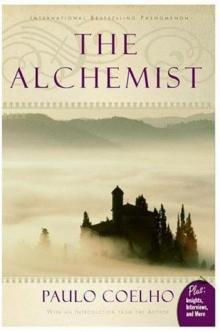 The Alchemist
The Alchemist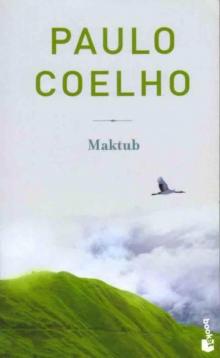 Maktub
Maktub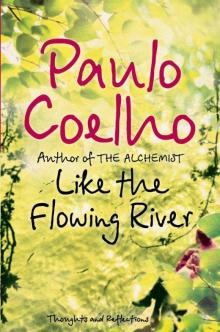 Like the Flowing River
Like the Flowing River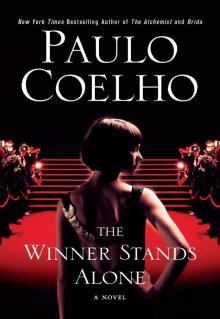 The Winner Stands Alone
The Winner Stands Alone The Spy
The Spy By the River Piedra I Sat Down and Wept: A Novel of Forgiveness
By the River Piedra I Sat Down and Wept: A Novel of Forgiveness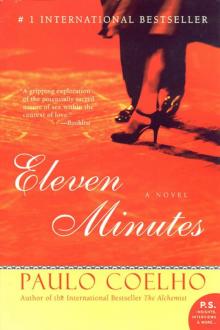 Eleven Minutes
Eleven Minutes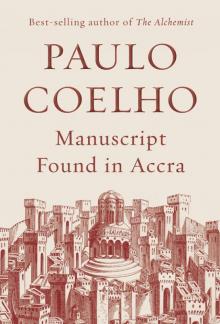 Manuscript Found in Accra
Manuscript Found in Accra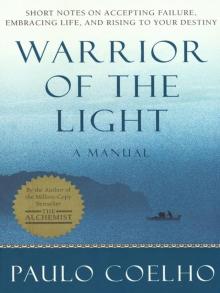 Warrior of the Light
Warrior of the Light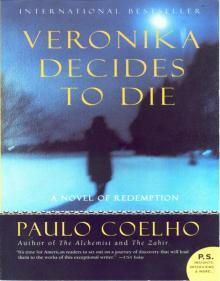 Veronika Decides to Die: A Novel of Redemption
Veronika Decides to Die: A Novel of Redemption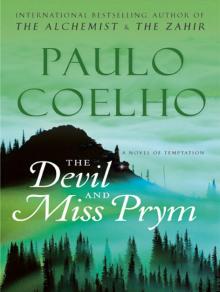 The Devil and Miss Prym: A Novel of Temptation
The Devil and Miss Prym: A Novel of Temptation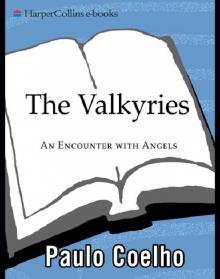 The Valkyries: An Encounter With Angels
The Valkyries: An Encounter With Angels Brida: A Novel
Brida: A Novel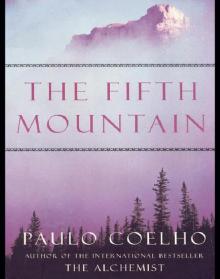 Fifth Mountain: A Novel
Fifth Mountain: A Novel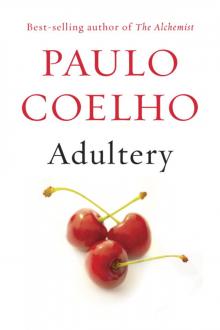 Adultery
Adultery Inspirations
Inspirations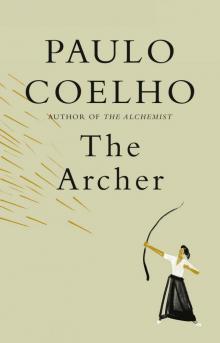 The Archer
The Archer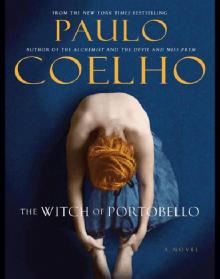 The Witch of Portobello
The Witch of Portobello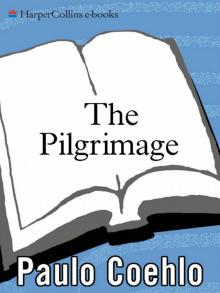 The Pilgrimage
The Pilgrimage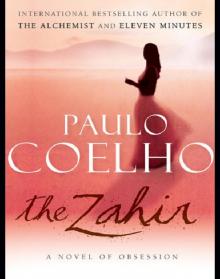 The Zahir
The Zahir Brida
Brida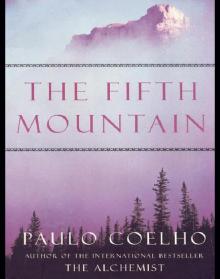 The Fifth Mountain
The Fifth Mountain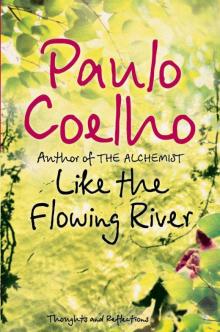 Like the Flowing River: Thoughts and Reflections
Like the Flowing River: Thoughts and Reflections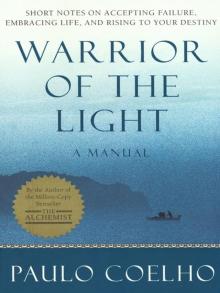 Manual of the Warrior of Light
Manual of the Warrior of Light By The River Piedra I Sat Down & Wept
By The River Piedra I Sat Down & Wept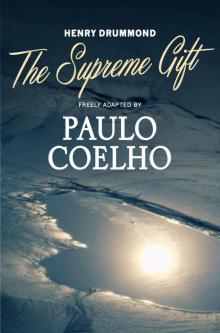 The Supreme Gift
The Supreme Gift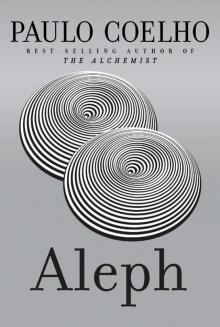 Aleph
Aleph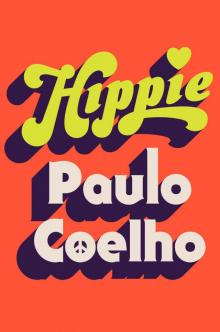 Hippie
Hippie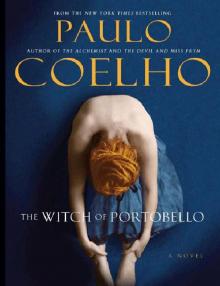 Witch of Portobello
Witch of Portobello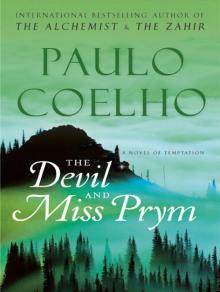 The Devil and Miss Prym
The Devil and Miss Prym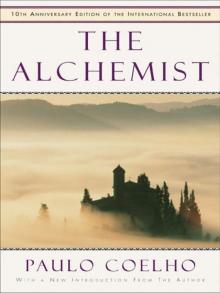 The Alchemist - 10th Anniversary Edition
The Alchemist - 10th Anniversary Edition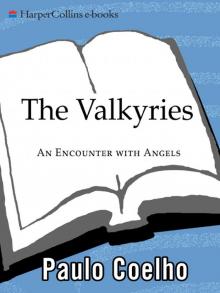 The Valkyries
The Valkyries